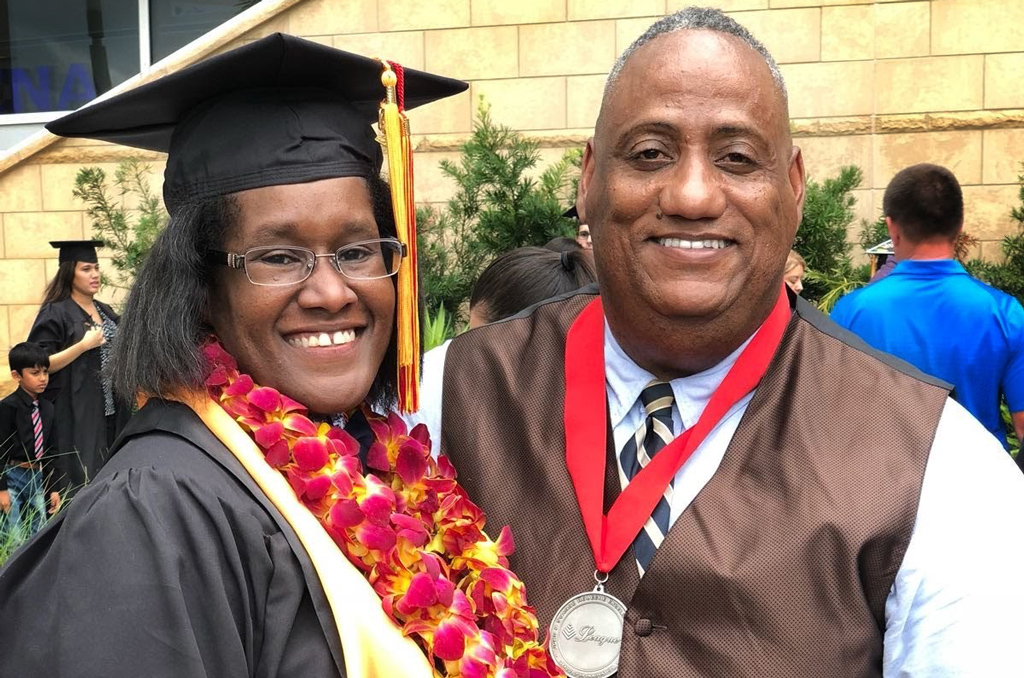As a young girl growing up in Fort Myers, Manvella Pope got her kicks from taking things apart. Cassette players, Walkmans, and computers, for example. There was no time for dolls. “I was too busy playing with electronics,” she says.
Fast forward to the present, Pope, a 2018 graduate of Valencia’s Electrical and Computer Engineering Technology program, is enjoying a career in the hot field of cybersecurity, where she helps protect digital systems, networks and programs from external attacks. When she was introduced to the field at a Cybersecurity Club meeting at Valencia, she says, “I fell in love.”
In 2020, she received her master’s degree in cybersecurity from the University of South Florida, and today she is enrolled in the Ph.D. degree program for computer engineering at the University of Central Florida. For most of her educational journey, she has worked full time while juggling coursework.
While at Valencia, Pope was a network operation analyst for Summit Broadband. Next, she worked as a network control specialist for Harris Corp. and more recently as a security engineer for the government services company, ASRC Federal. She’s now a cyber intelligence analyst, but she respectfully declines to reveal the company’s name. Like an undercover agent, she understands too much about the dark world of computer crime to subject her employer to a spiteful attack.
If Pope’s long curiosity about technology and her profession seem a match made in heaven, the journey to her dream job has been anything but easy. Pope is the first in her family to graduate from college. She alone shouldered the burden of financing her education. She worked nights to pay for tuition, rent and groceries, she slept just three to four hours a day, and she grappled with the difficulty of her coursework.
“There were times I thought I would give up, no ifs, ands and buts about it,” she says.
Pope, 46, has been at her studies for a long time. Her family had limited resources but encouraged her education. Her late father was a Navy machinist and then worked in the cement industry and for the City of Fort Myers; her mother was a certified nursing assistant and later supervised a hotel’s housekeeping staff. Pope’s first name is a composite of the names of her maternal grandmother, Viverly, and of Nelson Mandela, the Nobel Peace Prize winner and first black president of South Africa.
Pope received an A.A. degree with a foundation in engineering from Edison Community College (now Florida SouthWestern State College) in Fort Myers in 2000. She set off immediately for the University of Central Florida in Orlando, where her brother lived, to pursue a degree in electrical engineering. But she flunked out the first year. Her challenges outside of school, including transportation—she had no car and sometimes no money for the bus—and the untimely death of her paternal grandmother, proved to be too much. “I was burning the candle at both ends and then some,” she says.
Demoralized but determined to continue her education, she went to Plan B and her love of music, enrolling in the audio engineering program at Valencia. After receiving her A.S. degree in 2005, she worked for Radio Disney and even had her own DJ company, mixing music at parties and special events.
But after a time, she followed her heart back to school. Refusing to give up her original ambition of attaining a bachelor’s degree in electrical engineering, Pope hoped Valencia’s four-year program was the answer. And it was.
Dr. Charles Davis, who has been at Valencia almost 20 years, was the advisor in the program then and a mentor to Pope. He recommended her for two scholarships: Valencia’s Black Advisory Committee Incentive Award, which honors students “who have persisted and succeeded despite great adversity,” and more recently for the Florida Education Fund’s McKnight Doctoral Fellowship, which is designed to increase the number of African-Americans and Hispanics in disciplines where they have been historically underrepresented. It was easy to get behind Pope, Davis says.
“She was very respectful,” he says, and he saw “that she had drive, that she had leadership skills, and that she was motivated and she was not going to let anything discourage her.”
When things got tough, Davis was available to tell her to “stick with it, keep going,” Pope says. “He was a pillar in our program, and he still is,” she says. “If Dr. Davis had not been there, we would have thrown our hands up.”
At one point, she almost quit. A professor in the program discouraged her from continuing in electrical engineering. Davis talked her down and helped her switch tracks to computer systems. It was where she was meant to be. “What you can do with certain tools, it is magnificent!” she says.
The support she received at Valencia was the foundation for all that has followed, Pope says. “When the days get tough, you can actually speak to someone and lean on their shoulders.”
She notes that at her senior design presentation at Valencia, the same teacher with whom she had had the conflict sought her out to praise her work.
At Valencia, Pope became involved in professional organizations, including as an officer in the National Society of Black Engineers and the Institute of Electrical and Electronics Engineers. These groups, she says, helped her build connections and increased her exposure to national developments.
Today, though her job does not require it, Pope is committed to pursuing her doctorate. It is more a personal quest than a professional one.
“It is not just for me, it is for the community,” she says, “a community worldwide that looks like me, talks like me.”
Today, Pope is setting an example in post-graduate work in the very school where she once suffered a stunning setback. Davis, who received his own Ph.D. at age 51, couldn’t be more proud of his former student and now friend.
“She is definitely going places,” he says. “It is not going to stop.”
